Working for free: Lawyers incorporating pro bono into their lives talk about its rewards, challenges
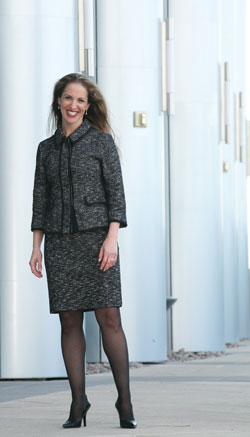
Photo of Kate C. Lowenhar-Fisher by Jonah Light.
Over the years, and especially during the last several decades, pro bono legal service has taken many forms.
A lawyer files an insurance claim for a neighbor after a fire. Two attorneys help a group of Vietnam veterans get recognized as a nonprofit by the IRS. The general counsel of a corporation joins a charity board. A large firm, better known for its work on mergers and acquisitions, files a death penalty appeal. A local tax lawyer runs for the school board.
Once perceived and defined as “charity work” governed solely by personal conscience, pro bono has evolved into a professional responsibility and a powerful force inside the practice of law.
In a 2004 study of pro bono politics, Scott L. Cummings of UCLA School of Law described pro bono as the “dominant means of dispensing free representation to poor and underserved clients,” eclipsing even tax-supported institutions.
Pro bono has morphed in form from every conceivable direction—from an informal relationship with clients and their problems to a more affirmative obligation of the profession.
In recent years, corporate clients have begun demanding attention to pro bono work as part of their relationship with outside law firms. The law firms themselves have institutionalized pro bono work, making it as important as the billable hour in the firm’s recruiting and marketing. Pro bono service does not lack controversy. Lawyers often donate their talents to cutting-edge legal issues from all corners of the political spectrum.
But despite this newly formalized face of pro bono, there are still individual lawyers at the heart of every pro bono experience. In each and every case, a lawyer is investing his or her time, skills and reputation into the causes of community. These lawyers walk away with stories about the courage of their clients, the changes they helped effect, the lives they’ve helped reshape—sometimes even their own.
We’ve asked a few of these lawyers to share their stories, and they’ve been generous in doing so. In the following pages, they describe what they have derived from their pro bono work. Each of these stories is different, sometimes wildly different. But the one thing they share is a new, personal understanding of the professional obligation that is pro bono publico.
Kate C. Lowenhar-Fisher
Kate C. Lowenhar-Fisher, who represents foster children on a pro bono basis, has spent hours watching movies and painting toenails with two of her clients, 11-year-old twin girls. She also has had many meals at Chili’s because the chain restaurant’s molten chocolate cake was another client’s favorite.
“I leave my phone and briefcase in the car when I’m meeting with kids,” says the partner with Brownstein Hyatt Farber Schreck in Las Vegas. “You always have to be listening and not just thinking about the next question you’re going to ask.”
The second child of a casino industry executive and a schoolteacher who’ve been married 44 years, Lowenhar-Fisher grew up in New Jersey, with doting grandparents nearby. She’s so close with her parents that after graduating from Emory University School of Law she followed them to Las Vegas, where they moved for her father’s career.
Married to an IT consultant she met on JDate, Lowenhar-Fisher is also the mother of a 2-year-old son. Shortly after he was born, her in-laws moved to Las Vegas to be near their grandson. The differences between her background and those of her pro bono clients, Lowenhar-Fisher notes, are striking.
“I can’t imagine what it would feel like to be affirmatively rejected by your parents,” says the lawyer, who serves as her firm’s pro bono coordinator in addition to her work with gaming industry clients. “These kids are put in a lousy, awful, unimaginable position—to make these very adult choices they shouldn’t have to be making.”
One boy going by the pseudonym Christopher became Lowenhar-Fisher’s client when he was 10. His mother, reportedly a prostitute addicted to crystal meth, has eight other children. Christopher was removed because she pulled a knife on him several times, Lowenhar-Fisher says.
“The eight years I represented him, his mother changed her mind six times about whether she wanted him,” says Lowenhar-Fisher, adding that when he was 11, his mother told Christopher in a hearing that she didn’t want him.
Afterward, Lowenhar-Fisher asked Christopher how he felt.
“He said, ‘I’m not her son. I want another family,’ ” she recalls. “The strength and character of an 11-year-old to be standing on his feet after hearing that just knocks me out.”
When Christopher got arrested for fighting and shoplifting, Lowenhar-Fisher bought him a suit and sat in the gallery during trial for moral support. She also visited him weekly when he was sentenced to juvenile detention, bringing him homework and French fries.
“We talked about what he was going to do next, and how orange jumpsuits are not in our future.”
Katie Greeson, who met Lowenhar-Fisher in law school, says that sort of behavior is typical. The two calmed each other down at Emory and agreed that while they wanted to do well, it shouldn’t come at the expense of their or others’ personal happiness.
“She’s a champion for her friends,” says Greeson, a senior vice president at Bank of America in Charlotte, N.C. “It’s just wonderful to hear how strongly she believes you can do something—then you believe in yourself.”
When Christopher’s detention time was up, according to Lowenhar-Fisher, he had some unresolved anger issues. Christopher is black, and with his probation officer and clinical worker she helped get him to a Texas long-term treatment facility for boys of color in foster care. The experience removed him from bad influences in Las Vegas, Lowenhar-Fisher says, and allowed him to meet many successful black men he could emulate.
Christopher came back to Las Vegas, was placed in a different group home and started his senior year at a new school, getting A’s in three advanced-placement classes and working 25 hours a week. Then a teacher claimed Christopher verbally threatened him. He faced expulsion, and Lowenhar-Fisher knew she had to attend the principal’s meeting.
“This was beyond the scope of what I had done for Christopher, but I didn’t give a damn. This kid was either going to be facing expulsion alone—and we know what the outcome in that scenario would have been—or I would be there by his side,” she says, adding that her client wrote a wonderful statement, by himself, which was contrite while politely contesting the teacher’s version of events.
Neither side alleged that any physical contact took place, but the principal recommended expulsion based on the school’s no-violence policy, Lowenhar-Fisher says. She prepared to contest the finding with the Clark County School District.
“I thought if I could be as noisy as possible, that would be a good tactic to get the outcome we wanted.” The appeals officer reversed the principal’s decision, and Christopher graduated on time. Now 19, he attends a Las Vegas community college.
“When Christopher got into college, he called me and said I was the only person he had to call,” says Lowenhar-Fisher. “Of course I screamed ‘Congratulations!’ and ‘When are we going to Chili’s?’ ”
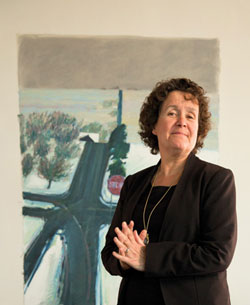
Photo of Elizabeth Joy Fossel by Wayne Slezak.
Elizabeth Joy Fossel
Maybe it’s because Elizabeth Joy Fossel lives in a rehabbed farmhouse outside Grand Rapids, Mich., that she’s so down to earth. Or maybe it’s the water lily garden and the flock of geese she keeps. Or maybe it’s because Fossel, who goes by her middle name, loves Disney World and makes multiple trips to the park, even though her children are grown.
Whatever the reason, Fossel, a partner at Grand Rapids’ Varnum Law Firm, knows that litigants’ cases can be all-consuming. She is adept at helping clients see that their matters will eventually end, colleagues say.
“The true reason I went to law school was to help people who are really in a pickle,” says Fossel, who usually handles 100 to 250 hours of pro bono work a year. In 2012, Fossel received a pro bono services award from the Legal Services Corp. Rarely, Fossel says, will she turn down a pro bono case, and she prefers the quirky ones. A recent case involved an elderly blind man who faced a $25,000 cleaning bill after a friend shot and killed himself in the client’s summer home—a trailer in Michigan’s Upper Peninsula.
After the suicide, the client signed a 25-page contract with a cleaning service, according to Fossel, although he couldn’t read what it said. Workers wrecked his trailer, she adds, and billed him, but he had only $4,000 worth of insurance and made that clear before the job started. Fossel discovered there was a consent judgment involving fraudulent business practices against the cleaning company in a different state. Also, Fossel says, she showed the company’s general counsel that the trailer damage was caused by its employees, not by the suicide. Ultimately the business decided not to pursue the bill.
“Maybe I’m just lucky and I get to work with reasonable people,” says Fossel, adding that the client used his insurance money to fix the damage.
Fossel got her JD at Thomas M. Cooley Law School after her husband, Dr. Michael Fossel, finished his residency. The two met as undergraduates at Stanford University and were engaged two weeks later. They’ve been married 37 years. Colleagues describe Fossel as a talented litigator who doesn’t take herself too seriously. That can be disarming for opposing counsel.
“If you ask her how she’s doing, she doesn’t say, ‘I’m busy,’ which is the automatic lawyer response,” says Mark S. Allard. Also a Varnum partner, he’s known Fossel 22 years.
“She’s not in automatic business-development mode,” Allard adds. “She’s in life mode.”
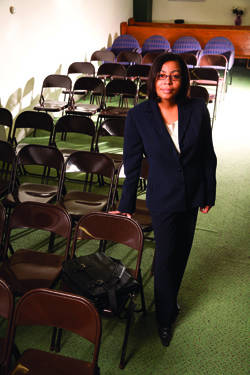
Photo of Melissa L. Williams by Wayne Slezak.
Melissa L. Williams
In Chicago, work is scarce, murders have increased, and assaults and muggings are reported in neighborhoods with traditionally low crime rates.
Being kept out of the job market, particularly if you have a criminal record, is at the heart of the problem, says Melissa L. Williams, who oversees on a pro bono basis the Wiley Resource Center, a legal clinic that provides free consultations and helps people expunge or seal their criminal records.
“Some people are bad seeds. For others, it’s their environment and they don’t have any opportunities,” she says. “A lot of folks will tell you, ‘If I were able to get a job, it would help me change.’ ”
The clinic is open the third Saturday of every month, starting at 12:30 p.m. People are instructed to bring their rap sheets, and volunteer lawyers go over them. Once a month, Williams goes with other volunteers to Cook County Circuit Court to pull people’s files, comparing rap sheets with court records. She usually prepares the paperwork to seek expungement or to have records sealed, and the individuals file the forms with the court.
“The courts and the prison review board, when applicable, want to see that ex-offenders have been rehabilitated,” Williams says. “We tell people they need to be prepared to explain who they are now, and why they are different from when they were arrested.”
According to Williams, the most common offenses deal with drugs and theft. Often, the convictions date from the 1990s and the person hasn’t been in trouble since.
“So we have to do something about this,” she adds. “We can’t have a population of people who can never work again.”
Williams started the pro bono clinic in 2003, after graduating from Chicago’s John Marshall Law School. It’s held weekly at ST Pilgrimage Church in the city’s Lawndale neighborhood and is named after the church’s pastor, Roosevelt Wiley, who is also Williams’ stepfather.
“He’s been pastoring here for 30 years, and we wanted to have that connection of being consistent because so many things that come to the community don’t last,” says Williams, who is between paying jobs. She supports herself with contract legal work and is a hearing officer with the Metropolitan Water Reclamation District.
Also active with the West Side Chicago branch of the National Association for the Advancement of Colored People, Williams chairs the group’s criminal justice committee. The organization supports a pending Illinois bill that would amend the Criminal Identification Act to include non-violent felonies as sealable offenses, four years after termination of an individual’s sentence. It would not seal sex offenses, DUIs or reckless driving convictions, or actions described in the Crime Victims Compensation Act. It also would not provide relief to individuals who were convicted for violating restraining orders.
“She is a household name on the West Side of Chicago. Her name is firmly embedded in people’s consciousness. She’s done so much in terms of helping others,” says Lewis W. Powell III, an adjunct professor at John Marshall. He met Williams when she was a student and helped her set up the Wiley Resource Center.
“She’s not one to mess with,” he adds. “She’s going to stand her ground against anybody, and she’s a people’s advocate.”
Williams grew up in the western and southern Chicago suburbs. The TV show Law & Order, along with John Grisham novels, helped spark her interest in the law. “I wanted to practice ‘tarts,’ ” she says, recalling her childhood take on tort law. She grew up attending Shepherd’s Temple, which became the ST Pilgrimage Church that now houses the legal clinic.
“Most people think the law is one of the successful careers out there. They determine success by how much money can be made,” she says. “When I started recognizing what was going on around me, I saw a different side of what’s needed.”
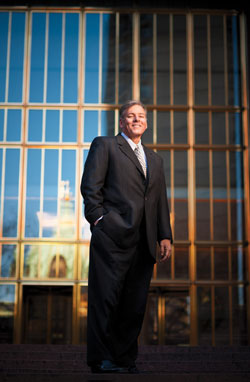
Photo of James Hadden by Dave Moser.
James Hadden
If you want time or money from James Hadden, then kids, animals and cancer programs are a safe bet. He also has a soft spot for the homeless.
“And I’m always sending emails saying, ‘Hey, can you contribute to this or that?’ ” says the Philadelphia mass tort defense lawyer, who in 2011 received an ABA Difference Makers Award, given by the association’s Solo, Small Firm and General Practice Division. A director with Maron Marvel Bradley & Anderson, Hadden also spends about 100 hours a year as a child advocate for abused and neglected children. Any lawyer, Hadden says, can do pro bono work.
“You can get out of your comfort zone because almost all of these organizations give you training,” he adds. “If you have the idea that you want to help, you can find some group or organization who would appreciate it.”
Hadden is also a board member for the North Light Community Center, a children’s organization in Philadelphia’s Manayunk section, near the Catholic grammar school he attended. Each year Hadden donates time at his New Jersey shore vacation home, working with the organization For Pete’s Sake, which arranges free vacation rentals for cancer patients and their caregivers. He discovered the group when he was diagnosed with cancer in his neck and head in 2006. Hadden has been cancer-free for a year, and his family says the experience changed him, but only somewhat.
“He’s always been a caring person with a light touch, but I also think his illness kind of helped him with being empathetic,” says Hadden’s older brother Frank, who is also an attorney. Hadden is one of five children. Their father left when James was 4, and his mother, a registered nurse, moved the family into her parents’ house. She did that so she could take care of them after both were diagnosed with cancer.
“She had a life of service. When nieces and nephews had troubles, too, she was always the one who was there,” Frank Hadden says. “Jim, being the youngest in the family, was surrounded by that.”
The brothers graduated from St. Joseph’s Prep, a Jesuit boys’ school with the motto “Men for Others.” So did their uncles, older brothers and younger cousins. Hadden says his son, 12, hopes to attend the school too.
“We were always taught that we are part of a bigger world, and that we do not live in our own little bubble,” says Hadden, who also attended a Jesuit college, Connecticut’s Fairfield University. “I try not to be too judgmental when I review the case facts and go into the homes of my young clients. While I still find it is often a sad situation, I try not to blame the parents too much. … When I see the neglect, I realize that the parents themselves may have been raised in a similar fashion.”

Photo of Layne E. Kruse by Josh Huskin.
Layne E. Kruse
In 1982, James Roy Knox shot and killed Galveston, Texas, pharmacist Joe Sanchez with one bullet.
To a certain extent the bullet ultimately killed them both, and that’s what struck Layne E. Kruse, who handled Knox’s post-conviction habeas proceedings pro bono.
The robbery payoff for Knox was $15 taken from the cash register and four small bottles of the drug Demerol.
“It wasn’t exactly in cold blood, but if you’re in a drugstore holdup and you kill someone with one shot fired, that’s still capital murder,” says Kruse, a Houston trial lawyer who co-chairs Fulbright & Jaworski’s antitrust and competition practice group. Also a former head of the firm’s pro bono committee, he’s known for handling death row appeals.
The father of five and a former Sunday school teacher who grew up in central Texas, Kruse earned a master’s degree from the London School of Economics before he graduated from Yale Law School. He identifies himself as a Republican. That might surprise some, given his capital defense work, but to him there is no contradiction.
“If the government is going to take steps to end somebody’s life, it’s very important that lawyers be there to make sure it’s fair,” Kruse says. “I don’t want the government to overstep its bounds.”
Kruse is not opposed to the death penalty. But he is opposed to capital defendants being denied due process.
“I am not a crusader against the death penalty,” he adds. “What I am is a crusader to ensure that legal representation and justice is done.”
Kruse handled Knox’s appeal with Richard Carrell, a former Fulbright partner who is now of counsel to the firm. In 1991 they got the conviction reversed in the 5th U.S. Circuit Court of Appeals at New Orleans because of improper jury instructions.
Before the retrial the government offered Knox a deal of life in prison, which he rejected even though his lawyers said he should take it, Carrell says. With different legal representation, Knox was found guilty and sentenced to death again in 1994. He lost all his appeals and was executed in 2001.
Kruse witnessed the execution at his former client’s request—partially because Knox had few if any family members or friends. Also, Kruse says, he wanted to make sure the execution process was done correctly.
When asked whether he wished Knox had taken the government deal, Kruse responds that you can’t second-guess yourself in trial work.
Young attorneys love working with Kruse, says Annie M. Morrison Jacob, a former Fulbright associate who assisted him in both pro bono and paid work. He approaches the law creatively and engages associates when they ask questions, she says.
“He comes up with really interesting solutions,” adds Jacob, now a counsel at Bayer Corp. in Pittsburgh. “I think his passion for the job comes across, and that makes clients really comfortable. When he suggests a course of action, they know he really has put a lot of thought into it and he’s trying to do what’s best for them.”
Kruse is also open to associates’ ideas about case strategy, she adds, noting that his knowledge about the law is rarely if ever proven wrong.
“We used to joke that if he said he knew there was a case out there that said X, Y and Z, it was out there,” she says. “He may not have been able to give all the details off the top of his head, but he was right.”
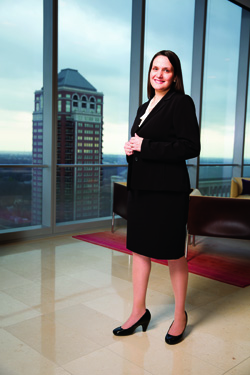
Photo of Amy Lorenz-Moser by Wayne Slezak.
Amy Lorenz-Moser
Most nights at bedtime Amy Lorenz-Moser’s 6-year-old daughter asks her mom if she got Donna out of prison yet.
“I can’t tell you how inadequate that makes me feel,” says Lorenz-Moser, the pro bono lawyer handling a clemency petition for Donna Biernacki, who is serving a second-degree murder sentence for killing her husband, James. Lorenz-Moser told her daughter that Donna killed someone who hurt her client’s four daughters, and that she’d be working hard to get her out of prison so Donna could go back to taking care of her children.
Biernacki is one of Lorenz-Moser’s pro bono clients imprisoned for killing partners who allegedly beat them and made them fear for their lives. Biernacki is serving a 20-year sentence. So far, three of Lorenz-Moser’s clients have been released from prison.
A partner with St. Louis’ Armstrong Teasdale who defends product-liability cases, she’ll tell you that her business clients are wonderful, but no one needs a lawyer like someone in prison. Last year she received an ABA Pro Bono Publico Award.
“Win or lose, what I’ve always liked about these pro bono cases is I feel I am 100 percent on the right side,” Lorenz-Moser says.
Biernacki’s clemency petition includes letters from her children, who wrote about how much they love and miss her. The petition also states that her husband, who didn’t work, abused alcohol, methamphetamines, crack, cocaine and marijuana. He dragged Biernacki by her hair, according to the petition, tried to strangle her and hit her with his fists.
On Dec. 2, 2004, after a day of fighting over his drug use, Biernacki said she planned to kill herself. She grabbed a loaded gun from their safe and left the house.
She changed her mind, according to the petition, returned home and found that her husband, who had run up $15,000 in debt for the couple, had taken all their household bills she kept in a filing cabinet. He pronounced that from that point forward, he’d handle their bills. Not able to drive due to five DWI convictions, he also said that his wife would take him wherever he needed to go, whenever he wanted.
And, Biernacki’s husband told her, her father could no longer visit their home, the petition states. A few months before, he’d banned her mother from their house.
“The bitch has got to go,” James Biernacki said next about the couple’s 15-year-old daughter, Kierstin, according to the petition. The two often fought, and the document alleges that he previously threw her out of the house.
According to Biernacki, she initially put the gun to her own head.
“Go ahead, I could use the money,” her husband said, according to the petition. That made Biernacki think he might kill her if she didn’t do it herself, the petition states, so she shot him instead.
Initially Biernacki told police his death was a suicide. She later recanted and confessed to the crime.
A political science major, Lorenz-Moser became interested in domestic violence as a student at Webster University after seeing a cafeteria worker attacked by her partner. Lorenz-Moser told the woman she’d be a witness, but the woman decided not to press charges, fearing it would make her situation worse. After the attack, Lorenz-Moser says, she never saw the woman again.
As a student at the University of Missouri School of Law, she helped represent women in prison for killing their spouses or significant others who beat them. At the time, state law held that the women faced life in prison without the possibility of parole or life sentences without the possibility of parole for 50 years.
In 2007 Missouri revised its criminal code to give such women parole eligibility and Lorenz-Moser, then in private practice, again took on their representation.
After many legal battles, including six parole hearings and two writs, two clients who could have had their sentences considered under the statute were granted parole.
“Amy was extremely convinced that she could win these cases,” says Patricia Harrison, who directs the Child Advocacy Clinic at Saint Louis University School of Law. “These cases we’ve worked on, we’ve hit every wall you can hit. But she’s like, ‘Well, they’re wrong and we’re right, so we’ve just got to give it another try.’
“It’s that whole demeanor of confidence, positiveness and persistence that’s really made us successful,” Harrison adds.
Biernacki’s case came to Lorenz-Moser after state appeals were exhausted. According to the clemency petition, the jury instructions during trial did not give proper information regarding battered spouse syndrome. While the National Clearinghouse for Defense of Battered Women sought pro bono help for Biernacki, the deadline for a federal habeas corpus petition passed.
“It’s very frustrating to me,” says Lorenz-Moser, adding that juries, judges, parole boards and governors often wonder why women like Biernacki don’t leave their domestic situations.
Initially, Lorenz-Moser didn’t bother to answer that question because to her it seemed obvious. Now she knows better.
Biernacki stayed with her husband because she was afraid of him, yet she thought she loved him, according to her lawyer. She also had no place to go with her four children.
“Domestic violence is a really complicated problem,” adds Lorenz-Moser, who also has a 3-year-old daughter.
“One of the things that is so great about this work is, I think, I’m helping make the world a better place for my daughters,” she adds. “It’s an overall statement on how society treats women that there’s so much resistance to correcting these sentences.”
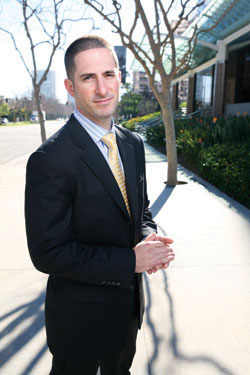
Photo of Scot Fishman by Jonah Light.
Scot Fishman
Friends call Los Angeles lawyer Scot Fishman “the king of all things warm and fuzzy.”
But Fishman, counsel and pro bono director at Manatt Phelps & Phillips, describes himself as a realist. Potential clients won’t pay law firms for inexperienced associates or litigation partners with scant trial expertise, he says. That’s where the business benefit of pro bono comes into play.
“When there’s not a bill to pay, it’s easier for the partner to supervise and let the associate run with the ball,” Fishman says. “The partner can see whether the associate has good judgment—and if not, it can be a teachable moment.”
Fishman honed his pro bono expertise as director at Dewey & LeBoeuf, the New York City-based firm that went bankrupt last year. Despite the infighting that accompanied the firm’s demise, Fishman has nothing but kind words for his former employer.
“The group of lawyers and staff at Dewey were so good and caring that it made my job a little bit easier,” he says. “Now that it’s over I think I learned a lot from that experience because it gave me some insight on how to do my job even better.”
Born in Queens and raised in Florida, Fishman left New York for Los Angeles last October and has spent his spare time exploring his new city and finding furniture for his apartment, which is in an area that borders West Hollywood and Beverly Hills.
“My goal is to get to know my new family,” says Fishman, who in 2009 received a Pro Bono Publico Award from the Legal Aid Society of New York City. “I believe that what we do as pro bono professionals is very relationship-driven.”
In junior high Fishman read the play Inherit the Wind, which inspired him to be a lawyer. After graduating from the University of Virginia School of Law, Fishman joined LeBoeuf, Lamb, Greene & MacRae in 2003 as a first-year litigation associate. Chairman Steven H. Davis thought the firm should increase its pro bono hours and wanted a full-time lawyer to oversee the program. Fishman, a former Teach for America volunteer, got the job in 2006.
The year before Dewey shut down, The American Lawyer ranked it fifth in the publication’s annual pro bono report. In its final months the firm had about 700 active pro bono cases.
Dewey had strict policies and a set of best practices regarding pro bono work, Fishman says, and that helped tremendously. Many former colleagues took their pro bono cases with them. “We got a fair number of people from Dewey when it unfortunately fell apart,” says David Lash, managing counsel of O’Melveny & Myers’ public interest and pro bono services. He met Fishman through the Association of Pro Bono Counsel, a professional organization for pro bono practice managers.
“When I told them I’m friends with Scot Fishman, and I do what he does, their faces lit up,” Lash says. “It was an immediate bond.”
Fishman “represents what was universally loved about Dewey,” Lash adds. “Even those who felt bitter and disappointed about the firm, doing pro bono work and working with Scot transcended that.”
Write a letter to the editor, share a story tip or update, or report an error.


